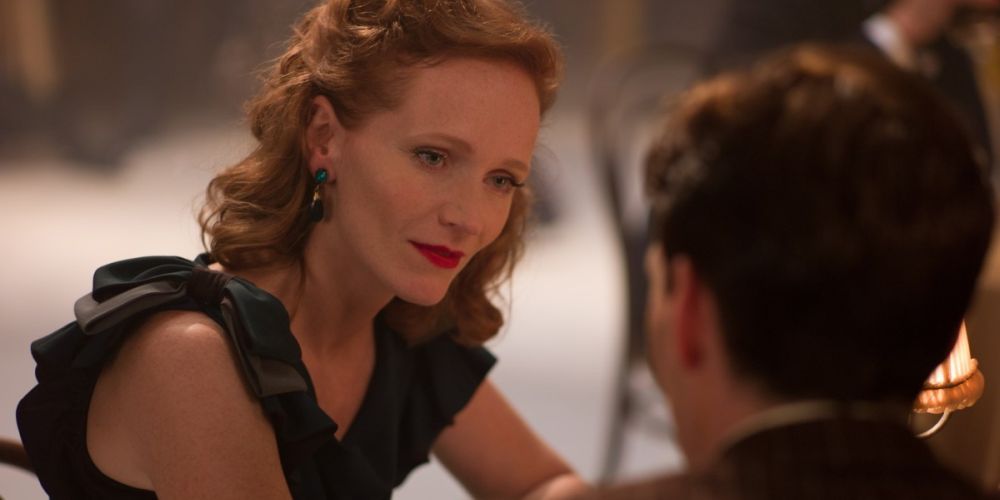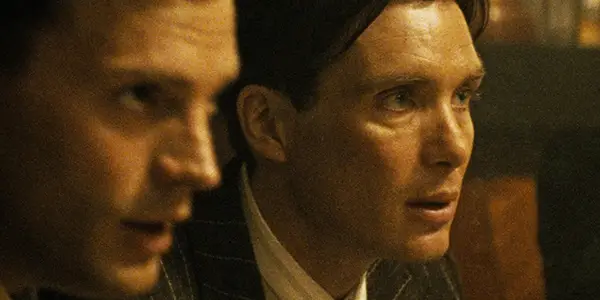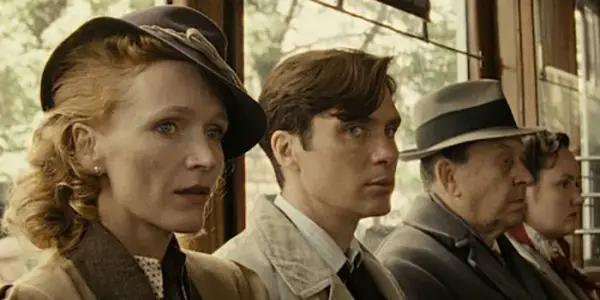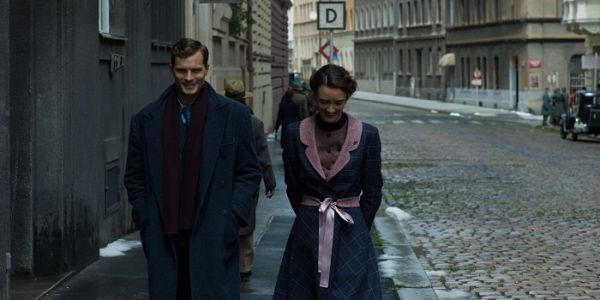ANTHROPOID: Martyrdom At The Heart Of War

Stephanie Archer is 39 year old film fanatic living in…
When it comes to World War II, there is never a shortage of stories that are needed and are waiting to be told. Anthropoid is one of these stories. The film begins with an introduction to the true events that have led up to the assassination of a high-ranking Nazi official to be rendered a necessary means in a time of war.
Hitler, who in the Munich Treaty was given Czechoslovakia by the allies to avoid war, has sent his third in command, SS General Reinhard Heydrich, to Prague, Czechoslovakia to eradicate the remaining opposition within the city – and the surrounding areas.
In response to his unrelenting cruelty and execution of thousands of Czechs, two men are parachuted into the country with one mission – to assassinate the General. They have been trained and come prepared to make the ultimate sacrifice to achieve their one goal.
Following along in their journey, viewers will be forced to examine different elements of this war that they may not have been forced to think about before.
Anthropoid
The film is beautifully set within the 1939 Czechoslovakian time period – a rough and dull lighting sets the mood of despair and a time of war. The biggest issue with this film, however, was the decision by the director, Sean Ellis, to not use a stationed camera while filming.
Immediately after the textual introduction is finished, the camera is jostled around the screen, causing difficulty for viewers to make out what is really happening as well as make out any of the beautiful time piece details – such as set and wardrobe. While in the beginning of Anthropoid this decision to use a moving camera is used to convey chaos and create tension, it unfortunately continues throughout the film, causing a distracted screening for viewers.

The writers, Sean Ellis and Anthony Frewin, do a beautiful job of crafting not only two characters that each represent a state of mind at the time, but a pairing as well. Josef Gabcik (played by Cillian Murphy) is the hard reality of the film. He is true to his training, knows his mission, and is here to complete it – no matter the sacrifice or the cost. In comparison, Jan Kubis (played by Jamie Dornan) is still holding on to the possibility that this mission may not need to occur.
Early in the film we see that Kubis is unable to kill the man who is a threat to their identity, showing his resistance to the reality of the times and of war. The women they find are contradictory to one another as well, matching up with the male of their likeness – one still believing in the “romance of war” while the other fully knowing that war is “not romantic”. With these contrasting representations of the time, the writers were able to accurately convey a world and a time through the characters they created.
Cillian Murphy delivers another strong performance, yet it was unfortunate that this role felt very reminiscent to his current role in Peaky Blinders. His Czech accent comes in and out, with his true Irish accent being the only element in the film that wavered from the authenticity of the place and time.
In contrast, Jamie Dornan was the biggest surprise, and gives the most satisfying performance of the film. He exemplified the anxiety and hopefulness of his character with precision and pose. Coming off the height of Christian Grey, it was refreshing to see him successfully tackle a character with such depth and meaning. He skillfully portrays an individual in the heart of war, still young and ignorant enough to hope that the inevitable will never come, and that the ways of life before the war can still live on in these dark days.
Love and Sacrifice
While the focus of Anthropoid revolves around ending the life of the third highest ranking Nazi official, this was not the only topic the film took a moment to examine. Love in a time of war and despair was also touched upon. Early on in the film, the parachutists, as the two main characters were frequently referred as, are each paired off with a female counterpart.

While at first they are a means to remain inconspicuous, love quickly takes hold in a wistful and almost desperate attempt to hold on to a previous life. These men allow themselves to love these women – even when the outcome of their assignment seems bleak from any viewpoint.
Viewers are forced to consider what it must have been like during the early years of the great war for individuals to experience love and relationships – especially as rebels. With war, many times there is no thought to the future, because for many there will not be one. There is no time to romance, to date, or to learn about one another. It is best to dive quickly into what you are feeling and commit to it – because you may never have the chance to with this person or anyone else.
Another topic that is examined in Anthropoid is the ultimate sacrifice made not only by soldiers – but also by civilians. We see those who want to fight against the regime, putting their lives and the lives of their families on the line. There is a moment within the film when the parachutists have revealed to the local opposition leader the mission they have been sent to carry out that perfectly exemplifies this sacrifice.
The men are asked by the leader, Ladislav Vanek, if they understand the implications of their actions, and of the severity of punishment that will be carried out on the people of Czechoslovakia and on the members of their families. Josef and Jan acknowledge the sacrifice, one that should be made by everyone who opposes the Nazi reign.

Yet, theses soldiers of war are not the only ones who will sacrifice everything. Multiple times we see families and individuals give everything to war and to the cause. They give themselves, their families, their sons and their daughters. There hopes for the future are torn away and they are left with nothing. Friends and family die around them; they alone having to bear the emotional torture and eventually find a way to survive it all.
This point is perfectly represented in the character of Marie Kovárníková (played by Charlotte Le Bon), who begins the film with unrealistic and romantic ideas of war only to come to the full realization and pain that war brings. Many times when we think of the great war we think of the soldiers, the Nazi regime and the thousands upon thousands of men, women and children that lost their lives. This movie forces you, even if only for a brief moment, to remember those who survived, yet lost everything and everyone around them.
Final Thoughts
The end of Anthropoid concludes just as it began – but with the text telling the aftermath rather than the lead up. Within the text, it is revealed to viewers that Heydrich was one of the most influential contributors to “The Final Solution”. It is with this revealing that viewers are left with a series of questions to leave the film with.
Was this the right man we sacrificed lives to assassinate, or were the Allies too late in their response? Were the allies too late in their response to reverse the mistakes they had made in the Munich Treaty?
Yet, it is not only the questions that last line of text raises that is a final impact on audiences – it is also the justification for the actions you have just witnessed and for the casualties and consequences of war – justification for the permanently affected lives of those assassins, the death of Heydrich and the loss of thousands of Czech lives in the aftermath – the ends justifies the means.
While Anthropoid is promoted as a film surrounding the assassination of a high-ranking Nazi official, it proves to also shows the horrors of war in both love and sacrifice. It once again, like many World War II movies before, forces viewers to examine and contemplate the decisions made during a time of great distress and great fear – the worst the world has ever seen.
Have you seen Anthropoid? Let us know what you thought in the comments below!
Anthropoid was released in the United States on August 12, 2016 and will be released in the UK on September 9. For all international release dates, see here.
Does content like this matter to you?
Become a Member and support film journalism. Unlock access to all of Film Inquiry`s great articles. Join a community of like-minded readers who are passionate about cinema - get access to our private members Network, give back to independent filmmakers, and more.













